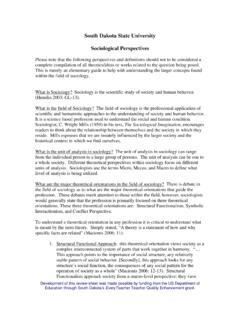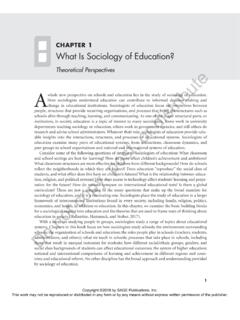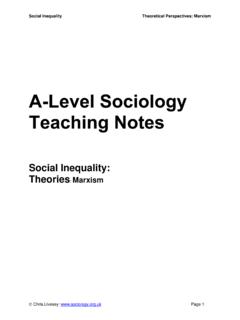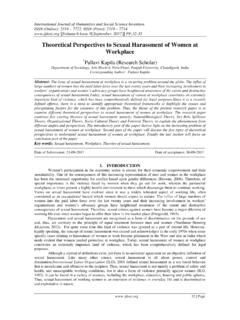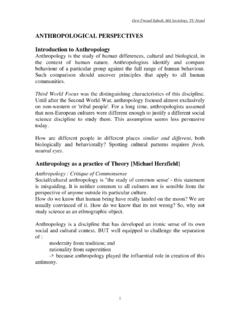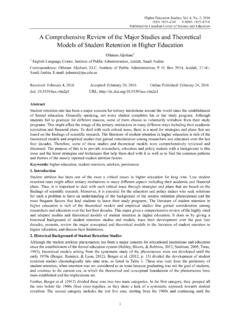Transcription of Theoretical Propositions of Life-Span Developmental ...
1 Developmental Psychology1987, Vol. , No. 5, 611-626 Copyright 1987 by the American Psychological Association, $ Propositions of Life-Span Developmental Psychology:On the Dynamics Between Growth and DeclinePaul B. BaltesMax Planck Institute for Human Development and EducationBerlin, Federal Republic of GermanyLife- span Developmental psychology involves the study of constancy and change in behaviorthroughout the life course. One aspect of Life-Span research has been the advancement of a moregeneral, metatheoretical view on the nature of development. The family of Theoretical perspectivesassociated with this metatheoretical view of Life-Span Developmental psychology includes the recog-nition of multidirectionality in ontogenetic change, consideration of both age-connected and discon-nected Developmental factors, a focus on the dynamic and continuous interplay between growth(gain) and decline (loss), emphasis on historical embeddedness and other structural contextual fac-tors, and the study of the range of plasticity in development.
2 Application of the family of perspectivesassociated with Life-Span Developmental psychology is illustrated for the domain of intellectual devel-opment. Two recently emerging perspectives of the family of beliefs are given particular first proposition is methodological and suggests that plasticity can best be studied with a researchstrategy called testing-the-limits. The second proposition is Theoretical and proffers that any develop-mental change includes the joint occurrence of gain (growth) and loss (decline) in adaptive assess the pattern of positive (gains) and negative (losses) consequences resulting from develop-ment, it is necessary to know the criterion demands posed by the individual and the environmentduring the lifelong process of study of Life-Span development is not a homogeneousfield. It comes in two major interrelated modes. The first modeis the extension of Developmental studies across the life coursewithout a major effort at the construction of metatheory thatemanates from Life-Span work.
3 The second mode includes theendeavor to explore whether Life-Span research has specific im-plications for the general nature of Developmental theory. Thesecond approach represents the topic of this , the purpose of this article is twofold. First, aftera brief introduction to the field of Life-Span Developmental psy-chology, some "prototypical" features of the Life-Span approachin Developmental psychology are presented. Second, these fea-tures are illustrated by work in one domain: intellectual devel-opment. Although the focus of this paper is on Life-Span develop-mental psychology and its Theoretical thrust, it is important torecognize at the outset that similar perspectives on developmen-tal theory have been advanced in other quarters of developmen-tal scholarship as well (Hetherington & Baltes, in press; Scan;1986). There is, however, a major difference in the "gestalt" inwhich the features of the Theoretical perspective of Life-Span psy-chology are article is based on invited addresses to Division 7 of the Ameri-can Psychological Association (Toronto, Canada, August 1984) and tothe International Society for the Study of Behavioral Development(Tours, France, July 1985).
4 Helpful suggestions by Michael Chapman and many valuable discus-sions with members of the Social Science Research Council Committeeon life -Course Perspectives in Human Development are concerning this article should be addressed to PaulB. Baltes, Max Planck Institute for Human Development and Educa-tion, Lentzeallee 94, D-1000 Berlin 3 J, Federal Republic of , if not most, of the arguments presented here are con-sistent with earlier publications by the author and others on thefield of Life-Span Developmental psychology (Baltes, 1983; Baltes& Reese, 1984;Featherman, 1983;Honzik, 1984;Lerner, 1984;Sherrod & Brim, 1986). This article includes two added empha-ses. First, it represents an effort to illustrate the implications ofthe Theoretical perspectives associated with Life-Span work forresearch in cognitive development. Second, two of the more re-cent perspectives derived from Life-Span work are given specialattention.
5 The first is that any process of development entailsan inherent dynamic between gains and losses. According tothis belief, no process of development consists only of growthor progression. The second proposition states that the range ofplasticity can best be studied with a research strategy called is Life-Span Development? Life-Span Developmental psychology involves the study ofconstancy and change in behavior throughout the life course(ontogenesis), from conception to The goal is to obtainknowledge about general principles of life -long development,about interindividual differences and similarities in develop-ment, as well as about the degree and conditions of individualplasticity or modifiability of development (Baltes, Reese, & Nes-selroade, 1977;Lerner, l984;Thomae, 1979).1 In this article, the terms life span and life course are used inter-changeably.
6 Since the origin of the West Virginia Conference Series(Goulet & Baltes, 1970), psychologists tend to prefer life span (see, how-ever. Biihler, 1933), whereas sociologists lean toward the use of the termlife B, BALTESIt is usually assumed that child development, rather than Life-Span development, was the subject matter of the initial scholarlypursuits into psychological ontogenesis. Several historical re-views suggest that this generalization is inaccurate (Baltes,1983; Groffinann, 1970; Reinert, 1979). The major historicalprecursors of scholarship on the nature of psychological devel-opment byTetensin 1777,Carusin 1808,Quete!etin 1835 were essentially Life-Span and not child-centered in these early origins of Life-Span thinking, however, Life-Span development has begun to be studied empirically only dur-ing the last two decades by researchers following the lead ofearly twentieth century psychologists such as Charlotte Biihler(1933), Erik H.
7 Erikson (1959), G. Stanley Hall (1922), H. (1927), and Carl G. Jung (1933).Three events seem particularly relevant to the more recentburgeoning of interest in Life-Span conceptions; (a) populationdemographic changes toward a higher percentage of elderlymembers; (b) the concurrent emergence of gerontology as a fieldof specialization, with its search for the life -long precursors ofaging (Birren & Schaie, 1985); and (c) the "aging" of the sub-jects and researchers of the several classical longitudinal studieson child development begun in the 1920s and 1930s (Migdal,Abeles, & Sherrod, 1981; Verdonik & Sherrod, 1984). Theseevents and others have pushed Developmental scholarship to-ward recognizing the entire life span as a scientifically and so-cially important justification for a Life-Span view of ontogenesis and im-portant scholarly contributions originate in other disciplines aswell.
8 One such impetus for Life-Span work comes From sociologyand anthropology (Bertaux & Kohli, 1984; Brim & Wheeler,1966; Clausen, 1986;Dannefer, 1984; Elder, 1985;Featherman,1983; Featherman & Lerner, 1985; Kertzer & Keith, 1983;Neugarten & Datan, 1973; Riley, 1985; Riley, Johnson, &Foner, 1972). Especially within sociology, the study of the lifecourse and of the interage and intergenerational fabric of soci-ety is enjoying a level of attention comparable with that of thelife- span approach in societal or social raison d'etre for the existence oflife- span interest is the status of the life course in longstandingimages that societies and their members hold about the life span (Philibert, 1968; Sears, 1986). In the humanities, for example, Life-Span considerations have been shown to be part of everydayviews of the structure and function of the human condition formany centuries.
9 The Jewish Talmud, Greek and Roman philos-ophy ( , the writings of Solon and Cicero), literary works suchas those of Shakespeare, Goethe, or Schopenhauer, all containfairly precise images and beliefs about the nature of life -longchange and its embeddedness in the age-graded structure of thesociety. Particularly vivid examples of such social images of thelife span come from the arts. During the last centuries, manyworks of art were produced, reproduced, and modified in mostEuropean countries, each using stages, steps, or ladders as aframework for depicting the human life course (JoeriBen &Will, 1983; Sears, 1986).These observations on literature, art history, and social im-ages of the life course suggest that the field of Life-Span develop-ment is by no means an invention of Developmental psycholo-gists. Rather, its recent emergence in psychology reflects the per-haps belated effort on the part of psychologists to attend to anaspect of the human condition that is part and parcel of oureveryday cultural knowledge systems about living social images suggest that the life course is something akinto a natural, social category of knowledge about ontogenesisand the human Life-Span Development a Theoryor a Field of Specialization?
10 What about the Theoretical spectrum represented by life -spandevelopmental psychology? Is it a single theory, a collection ofsubtheories, or just a Theoretical orientation? Initial interest of-ten converges on the immediate search for one overarching andunifying theory such as Erikson's (1959). The current researchscene suggests that in the immediate future Life-Span develop-mental psychology will not be identified with a single is above all a subject matter divided into varying scholarlyspecializations. The most general orientation toward this sub-ject matter is simply to view behavioral development as a life -long a lack of Theoretical specificity may come as a surpriseand be seen as a sign that the Life-Span perspective is fact, the quest for a single, good theory (and the resultingfrustration when none is offered) is an occasional challenge laidat the doorsteps of Life-Span scholars (Kaplan, 1983; Scholnick,1985; Sears, 1980).


